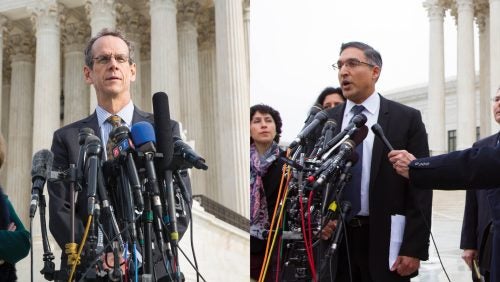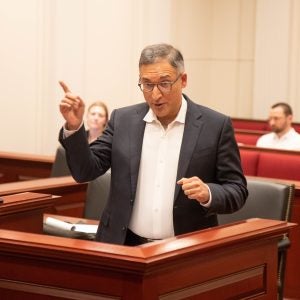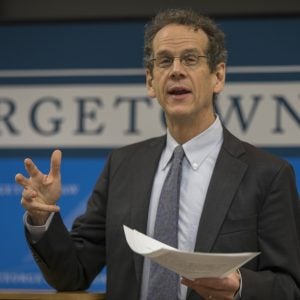

Professors Cole and Katyal are both veterans of Supreme Court oral arguments; this composite image is made of past photos of each answering media questions after leaving the Court.
Georgetown Law faculty are no strangers to the U.S. Supreme Court. In any given year, you can find our professors as authors of briefs, as amici and as oral advocates. But it’s never happened that the advocates on both sides of a case were both Georgetown Law faculty members… until now.
On Monday, March 18, in National Rifle Association v. Vullo, Professor David Cole, National Legal Director of the American Civil Liberties Union (ACLU), will represent the petitioner, the National Rifle Association (NRA), and Professor Neal Katyal, a partner at Hogan Lovells and former acting U.S. Solicitor General, will argue on behalf of the respondent, Maria Vullo, former superintendent of the New York State Department of Financial Services. The case concerns whether guidance issued by Vullo advising insurers in her state to consider the “reputational risks” of working with the NRA violated the First Amendment.
The stakes are high: the decision could have major implications for the First Amendment and government regulators. But while these two seasoned advocates are unlikely to pull any punches at the lectern on Monday, they also want to make it clear they have deep respect for one another. Though both Cole and Katyal were deep in the midst of preparations, including a moot session for Katyal at the Georgetown Law Supreme Court Institute, they took a few minutes to reflect on their big Georgetown v. Georgetown face-off in the highest court in the land.
For the aspiring lawyers at Georgetown Law, what’s a tip you can share about preparing for a Supreme Court oral argument?
 A man in a white shirt and dark jacket, standing at the podium in the Georgetown Law moot courtroom" width="300" height="300" />
A man in a white shirt and dark jacket, standing at the podium in the Georgetown Law moot courtroom" width="300" height="300" />
Prof. Neal Katyal, preparing to present his upcoming oral argument at a Georgetown Law Supreme Court Institute moot court session held March 14, 2024.
Katyal: I am a deep believer in moots. For my first case, Guantanamo [2006’s Hamdan v. Rumsfeld], I did 15 moots. I still will often do seven or eight in the big cases. For me, there is no substitute for being ripped apart by my team and outsiders. I record each moot, and then listen to it over and over, trying to figure out how I can answer questions better.
Cole: Like Neal, I’m also a big believer in moot courts. There is no better way to prepare. The fact that Neal did so many for his first case has led me to do more, both for myself, and for ACLU attorneys I help prepare for their arguments. I also find the moot court experience one of the high points of the practice of law; you get a bunch of very smart people in a room, all focused on the same hard questions, and you inevitably leave the room thinking differently. Of course, it’s more fun when you are not the person being mooted!
How do you view each other’s approach to preparing for SCOTUS oral arguments?
Katyal: David is just a brilliant advocate – he’s passionate and analytic at the same time, which is such a rare combination. I have only seen him on my side of the “v.” at the preparation stage – as someone who has mooted me and helped me think about my arguments. I love his ability to be thematic and cut through a lot of the noise.
Cole: Neal is a rare advocate. Super smart, passionate, quick with a quip, but always substantive. I think we have similar approaches to preparing for arguments. At the ACLU, we have often worked with Neal and Hogan on cases. So it’s an odd feeling to see him on the other side in this one. But I’m sure it will be a well-argued case. And at the end of the day, that’s what the Court wants.
Tell us something you have learned from, or admire about, your opponent in this argument – as an advocate, scholar or person.
 A man in a suit and tie, speaking at a Georgetown Law event" width="300" height="300" />
A man in a suit and tie, speaking at a Georgetown Law event" width="300" height="300" />
Prof. David Cole at a 2019 campus event
Katyal: In many ways, David Cole is who I want to be when I grow up. A brilliant advocate and scholar, and the nicest guy to boot. I do not think I would have had the career at the Supreme Court I’ve had were it not for David’s mentorship. He’s a true role model for our students.
Cole: Neal has been remarkably successful, both as an advocate for justice and as a scholar. His contributions to both Georgetown and constitutional law in the world outside Georgetown are massive. He has been a consummate government lawyer, private counsel and law professor. Oh, and TV personality! I’m not sure there’s anything he can’t succeed at.
Both Neal and I have devoted our careers to being engaged scholars, with one foot in the academy and one foot in the world. We use what we learn in practice when we teach our students. And we use the perspectives we gain as scholars in our advocacy. One of the things I most appreciate about Georgetown Law has been its support of precisely this kind of engaged scholar-advocate. I think it’s reflected in the law school’s motto, namely that “Law is but the means, justice is the end.” Many at Georgetown fit this model, serving in government or public service and using their talents both in school and outside to advance justice.
A group of Georgetown Law students attended the argument and shared their thoughts with us afterward – click here to read more!
Update: On May 30, the Supreme Court issued its decision in NRA v. Vullo, finding unanimously for the petitioner, the National Rifle Association, represented in the case by Professor David Cole, who is also National Legal Director of the American Civil Liberties Union. Georgetown Law congratulates both Cole and Professor Neal Katyal for their skilled arguments, and we look forward to seeing both advocates back at the Supreme Court in the future.